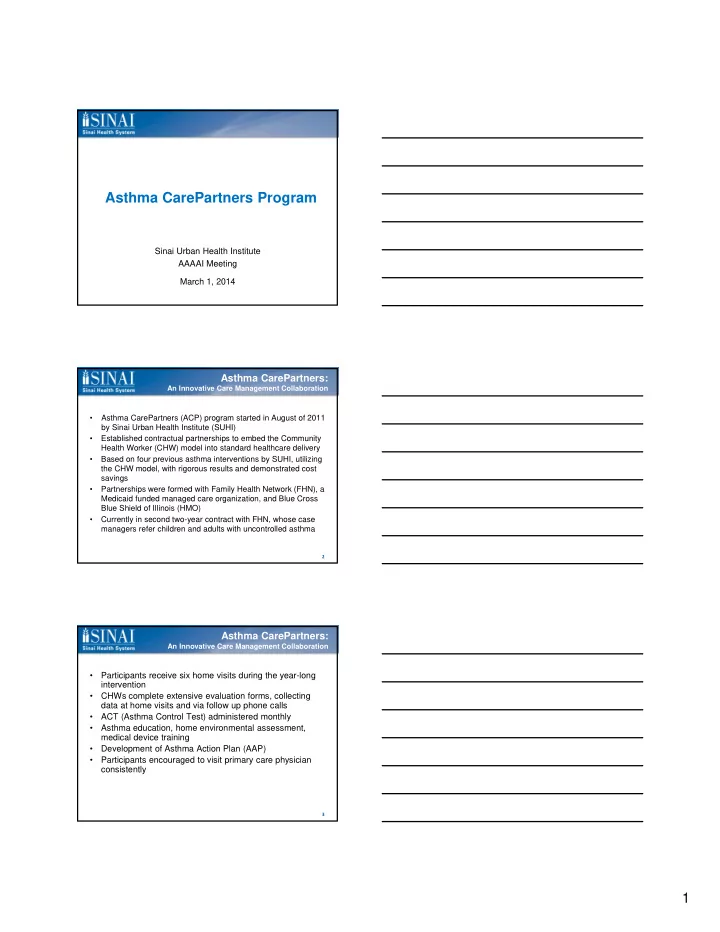

Asthma CarePartners Program Sinai Urban Health Institute AAAAI Meeting March 1, 2014 Asthma CarePartners: An Innovative Care Management Collaboration • Asthma CarePartners (ACP) program started in August of 2011 by Sinai Urban Health Institute (SUHI) • Established contractual partnerships to embed the Community Health Worker (CHW) model into standard healthcare delivery • Based on four previous asthma interventions by SUHI, utilizing the CHW model, with rigorous results and demonstrated cost savings • Partnerships were formed with Family Health Network (FHN), a Medicaid funded managed care organization, and Blue Cross Blue Shield of Illinois (HMO) • Currently in second two-year contract with FHN, whose case managers refer children and adults with uncontrolled asthma 2 Asthma CarePartners: An Innovative Care Management Collaboration • Participants receive six home visits during the year-long intervention • CHWs complete extensive evaluation forms, collecting data at home visits and via follow up phone calls • ACT (Asthma Control Test) administered monthly • Asthma education, home environmental assessment, medical device training • Development of Asthma Action Plan (AAP) • Participants encouraged to visit primary care physician consistently 3 1
Community Health Worker (CHW) Model • CHWs are trusted members of their community and have an unusually close understanding of the people they serve • CHWs are immensely effective in establishing honest relationships with the people they work with • The CHW in-home visits are indispensable since the condition of a person’s home can heavily impact asthma symptoms • Many children and adults are in need of individualized education on how best to control asthma since the issues that impede a person’s ability to manage asthma are complex and often require varying areas of expertise 4 ACP Program Outcomes • 265 participants were enrolled in the program from its inception on 8/16/11 and through 8/27/13 • Of those participating in the program, 52 had thus far completed the 12-month intervention • Health care utilization was decreased dramatically and symptoms were reduced 5 ACP Outcomes: Symptom Frequency Figure 1. Symptom Frequency in the past 2 weeks at Baseline vs. average during follow-up period (12 months) (n=52) * Statistically significant difference (p<.05) from baseline score. Wilcoxon signed-rank non-parametric test used to assess statistical significance. 6 2
ACP Outcomes: Health Resource Utilization Figure 2. Asthma-related Health Resource Utilization in the Year Prior to and Following the Intervention (n=52) . * Statistically significant difference (p<.05) from baseline score. Wilcoxon signed-rank non- parametric test used to assess statistical significance 7 ACP Program Conclusions • Program data demonstrates dramatic and life-changing improvement in asthma management resulting in: • Reduction in asthma symptom frequency • Reduction in health resource utilization • Improved quality of life scores • Findings regarding urgent health resource utilization support assertion that ACP is resulting in significant healthcare cost- savings, estimated at $3,200 saved per patient/year over costs incurred during the baseline year. This translates to $5.79 saved per dollar spent on the intervention. • Partnership between an asthma program and a health plan is a win-win for all! The lives of patients and families are improved, health care costs are reduced and money is saved. 8 ACP Wins URAC Award The Asthma CarePartners program won the 2013 URAC Gold Best Practices Award in health care consumer engagement and protection Julie Kuhn 773-257-2621 julie.kuhn@sinai.org 9 3
Recommend
More recommend